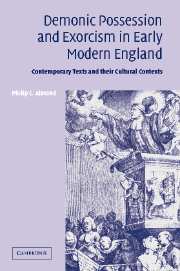 Demonic Possession and Exorcism in Early Modern England
Demonic Possession and Exorcism in Early Modern England Book contents
- Frontmatter
- Contents
- Preface
- Introduction
- Chapter 1 Disfigured by the Devil: The story of Alexander Nyndge
- Chapter 2 Two possessed maidens in London: The story of Agnes Briggs and Rachel Pinder
- Chapter 3 The witches of Warboys: The story of the Throckmorton children
- Chapter 4 The boy of Burton: The story of Thomas Darling
- Chapter 5 A household possessed: The story of the Lancashire seven
- Chapter 6 The counterfeit demoniac: The story of William Sommers
- Chapter 7 The puritan martyr: The story of Mary Glover
- Chapter 8 The boy of Bilson: The story of William Perry
- Chapter 9 A pious daughter: The story of Margaret Muschamp
- References
- Index
Chapter 2 - Two possessed maidens in London: The story of Agnes Briggs and Rachel Pinder
Published online by Cambridge University Press: 22 September 2009
- Frontmatter
- Contents
- Preface
- Introduction
- Chapter 1 Disfigured by the Devil: The story of Alexander Nyndge
- Chapter 2 Two possessed maidens in London: The story of Agnes Briggs and Rachel Pinder
- Chapter 3 The witches of Warboys: The story of the Throckmorton children
- Chapter 4 The boy of Burton: The story of Thomas Darling
- Chapter 5 A household possessed: The story of the Lancashire seven
- Chapter 6 The counterfeit demoniac: The story of William Sommers
- Chapter 7 The puritan martyr: The story of Mary Glover
- Chapter 8 The boy of Bilson: The story of William Perry
- Chapter 9 A pious daughter: The story of Margaret Muschamp
- References
- Index
Summary
On Sunday 15 August 1574, before all the congregation at Paul's Cross in London, Agnes Briggs and Rachel Pinder publicly admitted that they had faked being possessed by the Devil, and publicly repented. The records of their examinations and confessions were read to those gathered by the preacher. That they publicly confessed to having counterfeited demonic possession is not to be doubted. But whether their possessed behaviour was intentionally simulated is not quite so clear. Different strands within the text make possible alternative readings.
The editor of the work remains anonymous, but he is responsible for writing the preface, attaching a number of scriptural verses and part of a homily of St John Chrysostom. He is also to be credited with including four other documents (or parts thereof). Two of these were pamphlets, now lost, which give two different accounts of the exorcism of Rachel Pinder. Both were published shortly after 16 July, the date on which the handwritten version of the longer of the two was made. The third document gives an account of the examination and confession of Agnes Briggs, conducted by Robert Hodgson on the direction of Sir John Rivers, the Lord Mayor of London, independently of and probably prior to the confession of Rachel Pinder. Archbishop Parker's examination of Rachel Pinder and her eventual confession of fraud on 11 August is the fourth document incorporated by the editor.
- Type
- Chapter
- Information
- Demonic Possession and Exorcism in Early Modern EnglandContemporary Texts and their Cultural Contexts, pp. 58 - 70Publisher: Cambridge University PressPrint publication year: 2004


